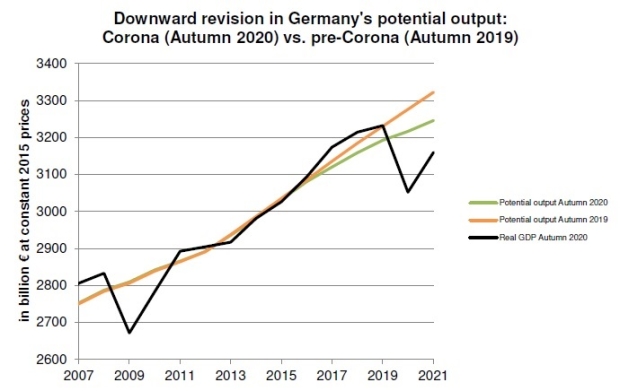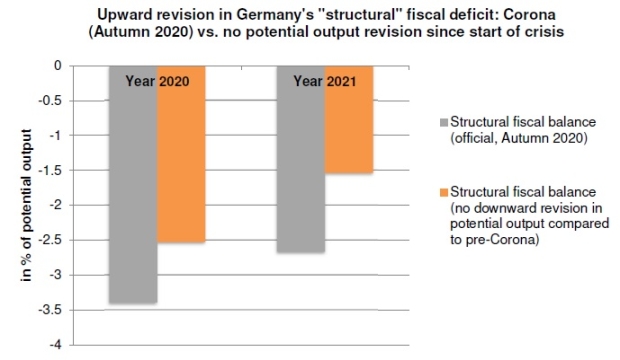Estimates that should set alarm bells ringing: Downgrading Germany’s fiscal space
26 November 2020
The EU Commission has just revised Germany's “structural” budget deficit for 2021 upwards – by €42 billion. The underlying estimation problems should set off alarm bells in Berlin.
A few weeks ago, ECB president Christine Lagarde voiced critique about it, but now the European Commission has done it again: in its latest economic forecast, it reinterprets the underutilisation of production capacities caused by the Corona crisis as a decline in potential output. According to the Commission, Germany’s potential output in 2021 will have fallen by 77 billion euros compared to the last estimate before Corona. As a result, the underutilisation of production capacities is revised downwards, implying that the estimate of the "structural" budget deficit for next year is soaring by 1.2 percent of GDP. As much as €42 billion of the budget deficit forecast is suddenly no longer attributed to the economic downturn (caused by the implications of the pandemic), but is now considered "structural".
Source: European Commission; own calculations.
If the European Commission’s model estimates indicate a severe underutilization of production factors in times of crisis, a large part of the budget deficit is attributed to cyclical factors: Increased government spending or reduced tax revenues are then not a "structural" burden on public finances, but rather the result of the economic downturn. Conversely, the "structural" budget deficit is large if the Commission sees hardly any underutilisation.
The revision in potential output with the Commission model are pro-cyclical; they are largely due to problems with the statistical filters used in the European Commission’s model. We know of problems with crisis-driven estimates from other euro area countries during the euro crisis.
In 2020, Corona causes a temporary supply-side shock in some sectors of the economy. But this does not justify an immediate and large downward revision of potential output for 2021 and the years to come. Economists and policymakers alike cannot know the longer-term effects of the crisis at this point.
Even if we knew for sure that there are factors pushing potential output down in the coming years (which we do not), would this justify a restrictive fiscal policy that would exacerbate the problems even further? It would be self-defeating to rely on pro-cyclical estimates of potential output.
All this is important because the medium-term budgetary objectives in the EU’s fiscal rules are formulated as limits on "structural" fiscal deficits. If the Commission revises the potential output of an economy downwards in times of crisis, the "structural" deficit increases. This increases the pressure on domestic policymakers to push for fiscal consolidation.
Source: European Commission; own calculations.
Looking ahead, this threatens to prevent effective economic policy, which is essential for successful economic recovery after the crisis. The alarm bells should be ringing in Germany.
The EU’s fiscal rules are currently suspended due to the crisis. However, as soon as they are reactivated, the "structural" budget deficits inflated by systematic estimation errors will limit the space that fiscal policy makers would bitterly need to further support recovery.
The Commission model is also crucial for the estimation of key estimates in the German "debt brake", which limits the federal government's borrowing to a "structural" deficit of 0.35% of GDP. For Germany’s federal states, there is even a ban on new structural borrowing. The estimates with the Commission model represent an even more binding target within the national framework of the "debt brake" than at the EU level.
It is high time that German policymakers start pushing for more reasonable estimates of the “structural” deficit based on the European Commission’s model.
Note: Translated and adapted from a column that first appeared in “Handelsblatt”. The original article is here (in German).


